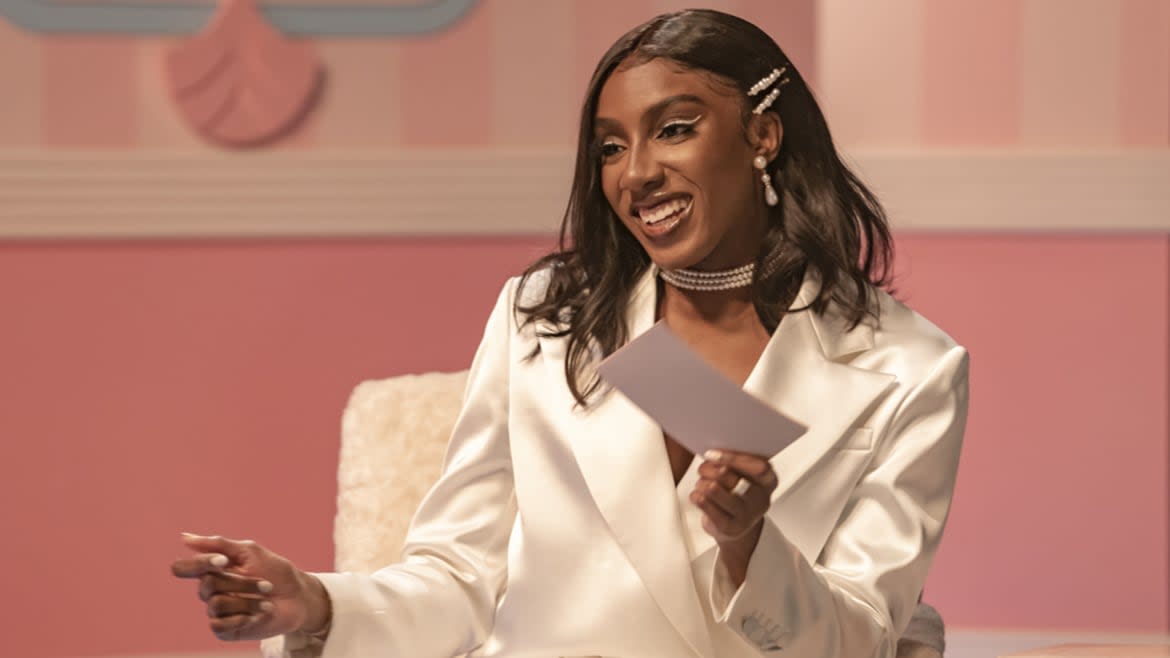Ziwe’s New Late-Night Series Is Off to a Truly Iconic Start

Ziwe Fumudoh always lets her interview subjects know when they’ve messed up. She might bulge her eyes, or she might tilt her chin ever so slightly, offering an encouraging grin that belies the predatory gleam in her stare—but either way, those with any hint of self-awareness usually realize they’re either in trouble or about to be.
The 29-year-old comedian, known professionally by the mononym Ziwe, has spent years perfecting the art of putting people on the spot about race with her web series, Baited with Ziwe. The show became a must-watch last year, when COVID-19 forced its creator to shift her production to Instagram Live. Ziwe grilled guests including Alison Roman, Caroline Calloway, Alyssa Milano, Rose McGowan, and Jeremy O. Harris. Often, Ziwe’s guests booked their appearances during or soon after a controversy—so the show evolved from a platform for Ziwe’s fellow comedians into a pulpit, of sorts, for celebrities to plead for forgiveness via public roast.
On Sunday, Ziwe will debut her new self-titled late-night series on Showtime. Those who’ve followed her work will recognize the Baited DNA; in this series, like the old one, the comedian greets her guests with an exaggerated clap and a beaming smile before taunting them with pointed (and at times pointedly absurd) questions about race. Her favorite weapons? An interested smile and the occasional humorous, loudly articulated edit. Her favorite targets? Traditionally, at least, white people with something to prove.
“What bothers you more,” Ziwe asks her first guest, Fran Lebowitz, during her season premiere. “Slow walkers or racism?”
But Ziwe also expands beyond the Baited formula with both pre-recorded comedic sketches and music videos, the latter of which the comedian performs herself. Each episode hones in on a topic like white women or wealth hoarding, addressed in each interview through a combination of awkward questions and deliciously wicked games. (Come for the episode in which Ziwe challenges her friends Bowen Yang and Patti Harrison to determine who among them is the richest, and stay for the one where she tricks Real Housewife Eboni K. Williams into choosing the most beautiful of two sets of facial features, one of which is her own.)
Any late-night show launching in 2021 faces an uphill battle. The mid-2010s cluttered the landscape, as every cable network and streamer suddenly seemed bent on launching their own franchise to compete with the long-running giants, and every year the audience grows more segmented than ever. Many new series struggle to establish a cohesive, appealing brand before the impatient network axe falls. This shouldn’t be an issue for Ziwe, which molds every aspect of its production around its namesake—who, like her Showtime contemporaries and former bosses Desus and Mero, comes to the table with a strong brand identity and, presumably, a sizable built-in audience of the extremely online. The question instead will likely be whether Ziwe will allow Ziwe to fully capitalize on her viral moment and expand it into something more.
Almost everything on the set of Ziwe is some shade of pink. Baby blue accents and an Art Deco flair give the space a vibe that reads like something between a Polly Pocket play set and Barb and Star Go to Vista del Mar. Serious tomes including autobiographies from Malcolm X and Assata Shakur nestle in stacks with those by Real Housewife Bethenny Frankel and WWE stars Brie and Nikki Bella, and there are also statues of giant books on the floor. And our host reliably arrives dressed to kill in thigh-high platform boots, luscious, hot pink fur coats, and tweed sets straight from Elle Woods’ closet. Each production choice seems to emerge straight from the confident, mischievous, and unabashedly self-promotional character Ziwe has created—reminding viewers at every turn why this series is nothing like those of the late-night Jimmies and Johns.
Ziwe interned for Stephen Colbert, and one can see traces of The Colbert Report’s approach here. Like the blowhard pundit “Stephen Colbert,” Ziwe’s “Ziwe” is a satirical tool whose identity largely defines the show. (Compare that to, say, The Tonight Show or The Daily Show, institutions that maintain their own identity apart from whoever happens to host.) While Colbert used his character to skewer the right-wing media during the Bush era, Ziwe’s target feels more systemic and, therefore, diffuse.
But at every level, this series belongs entirely to its creator. If the aesthetic and approach don’t make that clear, you can tell by the opening credits—which list Ziwe as the creator, executive producer, musical performer, and consultant (on behalf of herself).
As with any new series, Ziwe has its uneven spots. Some of the musical performances can drag for just a moment too long, and some of the sketches can feel redundant. But overall, these premiere episodes are a formidable start that seem to indicate Ziwe and her show have real staying power. Comedic interviewing has long been Ziwe’s specialty, and her conversations with guests including Lebowitz, comedians Bowen Yang and Patti Harrison, and Real Housewife Eboni K. Williams are a consistent delight. Each unfolds with a distinct tone—Lebowitz’s feels a bit more like an artful troll; Yang and Harrison are a little more in on the joke; Williams is just having a great time—that imparts a refreshing unpredictability.
Going forward, Ziwe’s challenge will be to establish an identity and mission beyond its namesake: What subjects is this series interested in tackling, why is it interested in those subjects, and what makes the show’s approach to them unique? But with this confident debut it’s already, to borrow one of its creator’s favorite phrases, off to a truly iconic start.
Get our top stories in your inbox every day. Sign up now!
Daily Beast Membership: Beast Inside goes deeper on the stories that matter to you. Learn more.

